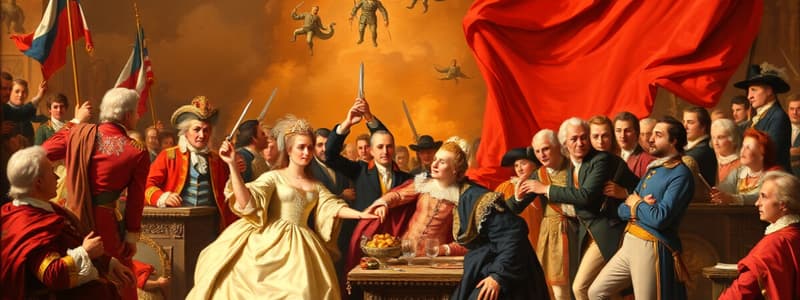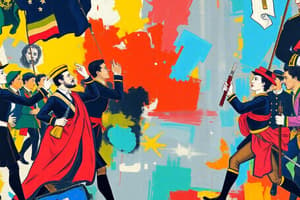Podcast
Questions and Answers
What ideology is associated with the French Revolution which emphasized liberty, equality, and fraternity?
What ideology is associated with the French Revolution which emphasized liberty, equality, and fraternity?
- Socialism
- Libertarianism (correct)
- Democracy
- Totalitarianism
Louis XV's reign saw France successfully emerge from the financial strain caused by the Seven Years' War.
Louis XV's reign saw France successfully emerge from the financial strain caused by the Seven Years' War.
False (B)
What was a significant outcome of the American War during Louis XVI's reign?
What was a significant outcome of the American War during Louis XVI's reign?
Public relations gain but fiscal loss
The French Revolution was partly fueled by economic issues such as inflation, unemployment, and __________.
The French Revolution was partly fueled by economic issues such as inflation, unemployment, and __________.
Match the French monarchs with their respective impacts on France's financial state:
Match the French monarchs with their respective impacts on France's financial state:
Who was the grandson of Ferdinand and Isabella?
Who was the grandson of Ferdinand and Isabella?
The Franco-Ottoman Alliance lasted from 1526 to 1789.
The Franco-Ottoman Alliance lasted from 1526 to 1789.
What major event occurred in 1525 involving the Habsburgs and Valois?
What major event occurred in 1525 involving the Habsburgs and Valois?
The Holy Roman Emperor faced humiliation during the Sack of _____ in 1527.
The Holy Roman Emperor faced humiliation during the Sack of _____ in 1527.
Match the following historical figures to their respective roles:
Match the following historical figures to their respective roles:
Who authored the 'Natural and Moral History of the Indes'?
Who authored the 'Natural and Moral History of the Indes'?
The Copernican Turn occurred in the 1540s.
The Copernican Turn occurred in the 1540s.
What philosophical concept is discussed by Montaigne in 'On Cannibals'?
What philosophical concept is discussed by Montaigne in 'On Cannibals'?
Aristotle believed the __________ was the perfect shape in ancient astronomy.
Aristotle believed the __________ was the perfect shape in ancient astronomy.
Match the following historical figures or works with their relevance:
Match the following historical figures or works with their relevance:
What event marked the beginning of the Age of Enlightenment in Europe?
What event marked the beginning of the Age of Enlightenment in Europe?
Olaudah Equiano was an abolitionist who never experienced enslavement.
Olaudah Equiano was an abolitionist who never experienced enslavement.
What was the name of Olaudah Equiano's personal narrative published in 1789?
What was the name of Olaudah Equiano's personal narrative published in 1789?
Equiano was involved with the group known as the ______ of Africa, which aimed to promote abolition.
Equiano was involved with the group known as the ______ of Africa, which aimed to promote abolition.
Match the following events with their respective time periods:
Match the following events with their respective time periods:
Which figure was cited as a Quaker merchant and abolitionist who still engaged in enslavement?
Which figure was cited as a Quaker merchant and abolitionist who still engaged in enslavement?
The portrayal of Europe in gendered terms often depicts it as a chaste and civilized woman.
The portrayal of Europe in gendered terms often depicts it as a chaste and civilized woman.
What question did James Sweet ask regarding Olaudah Equiano's claim about his ancestry?
What question did James Sweet ask regarding Olaudah Equiano's claim about his ancestry?
What was the name of Garcilasso de la Vega's father?
What was the name of Garcilasso de la Vega's father?
Garcilasso de la Vega primarily lived his life in Peru.
Garcilasso de la Vega primarily lived his life in Peru.
What significant event led to the execution of Atahualpa?
What significant event led to the execution of Atahualpa?
The Treaty of __________ established the Christianization Clause between Portugal and Spain.
The Treaty of __________ established the Christianization Clause between Portugal and Spain.
Which disease significantly reduced indigenous populations in Peru?
Which disease significantly reduced indigenous populations in Peru?
The Inca Empire was known for its political centralization and bureaucracy.
The Inca Empire was known for its political centralization and bureaucracy.
What was the title adopted by Garcilasso de la Vega in the 1580s?
What was the title adopted by Garcilasso de la Vega in the 1580s?
Match each figure with their action or position:
Match each figure with their action or position:
The __________ was a mechanism through which Spanish colonizers could take land and use indigenous labor.
The __________ was a mechanism through which Spanish colonizers could take land and use indigenous labor.
Which of the following roles did Garcilasso de la Vega NOT hold during his lifetime?
Which of the following roles did Garcilasso de la Vega NOT hold during his lifetime?
What was Jean-Jacques Rousseau's view on human nature as expressed in 'On the Social Contract'?
What was Jean-Jacques Rousseau's view on human nature as expressed in 'On the Social Contract'?
Rousseau married Therese Levasseur and they raised their children together.
Rousseau married Therese Levasseur and they raised their children together.
Who coined the term 'Enlightened Despotism'?
Who coined the term 'Enlightened Despotism'?
Frederick the Great of Prussia emphasized state-funded ________ as a part of his reforms.
Frederick the Great of Prussia emphasized state-funded ________ as a part of his reforms.
Match the following figures with their contributions or characteristics:
Match the following figures with their contributions or characteristics:
What was one of the main goals of Enlightened Despotism in Eastern Europe?
What was one of the main goals of Enlightened Despotism in Eastern Europe?
Diderot believed that science was not important for military advancements.
Diderot believed that science was not important for military advancements.
What did Rousseau mean by 'general wills'?
What did Rousseau mean by 'general wills'?
Flashcards
Rising Expectations and Revolution
Rising Expectations and Revolution
When people expect progress but instead experience setbacks, frustration can lead to revolutionary sentiment.
French Revolutionary Ideals
French Revolutionary Ideals
The ideals of liberty, equality, and fraternity fueled the French Revolution, promising a better future.
Seven Years' War and French Finances
Seven Years' War and French Finances
The Seven Years' War devastated France financially, leaving it in a precarious economic state.
American Revolution and French Finances
American Revolution and French Finances
Signup and view all the flashcards
French Colonies - Economic Lifeline
French Colonies - Economic Lifeline
Signup and view all the flashcards
Early Modernity
Early Modernity
Signup and view all the flashcards
Atlantic World
Atlantic World
Signup and view all the flashcards
The Age of Enlightenment
The Age of Enlightenment
Signup and view all the flashcards
Olaudah Equiano
Olaudah Equiano
Signup and view all the flashcards
Manumission
Manumission
Signup and view all the flashcards
The Sons of Africa
The Sons of Africa
Signup and view all the flashcards
Interesting Narrative
Interesting Narrative
Signup and view all the flashcards
Boundaries
Boundaries
Signup and view all the flashcards
Habsburg-Valois Conflict
Habsburg-Valois Conflict
Signup and view all the flashcards
Charles V (Charles I)
Charles V (Charles I)
Signup and view all the flashcards
Franco-Ottoman Alliance
Franco-Ottoman Alliance
Signup and view all the flashcards
The Battle of Pavia
The Battle of Pavia
Signup and view all the flashcards
The Sack of Rome
The Sack of Rome
Signup and view all the flashcards
Copernican Turn
Copernican Turn
Signup and view all the flashcards
Timeline of Change
Timeline of Change
Signup and view all the flashcards
Ptolemy's Geocentric Model
Ptolemy's Geocentric Model
Signup and view all the flashcards
Italian Renaissance Contributions
Italian Renaissance Contributions
Signup and view all the flashcards
Cultural Relativism
Cultural Relativism
Signup and view all the flashcards
Who was Garcilasso de la Vega?
Who was Garcilasso de la Vega?
Signup and view all the flashcards
What shaped Garcilasso's early life?
What shaped Garcilasso's early life?
Signup and view all the flashcards
What achievements did Garcilasso accomplish despite his identity?
What achievements did Garcilasso accomplish despite his identity?
Signup and view all the flashcards
How did Garcilasso's writing showcase his identity?
How did Garcilasso's writing showcase his identity?
Signup and view all the flashcards
What was the Hospital de Naturales?
What was the Hospital de Naturales?
Signup and view all the flashcards
What was the Treaty of Tordesillas?
What was the Treaty of Tordesillas?
Signup and view all the flashcards
What were some characteristics of the Inca Empire's political structure?
What were some characteristics of the Inca Empire's political structure?
Signup and view all the flashcards
What event weakened the Inca Empire before the Spanish arrival?
What event weakened the Inca Empire before the Spanish arrival?
Signup and view all the flashcards
Who were key figures in the Spanish conquest of the Americas?
Who were key figures in the Spanish conquest of the Americas?
Signup and view all the flashcards
What was the purpose of the 'Requerimiento'?
What was the purpose of the 'Requerimiento'?
Signup and view all the flashcards
Social Contract
Social Contract
Signup and view all the flashcards
Enlightened Despotism
Enlightened Despotism
Signup and view all the flashcards
Enlightened Despot
Enlightened Despot
Signup and view all the flashcards
Negative View Of Human Nature
Negative View Of Human Nature
Signup and view all the flashcards
State Of Nature
State Of Nature
Signup and view all the flashcards
General Will
General Will
Signup and view all the flashcards
Natural Rights
Natural Rights
Signup and view all the flashcards
Rousseau's Optimism
Rousseau's Optimism
Signup and view all the flashcards
Study Notes
Lecture 3 (09/04/2024): What Does It Mean to Be European?
- Early modernity in Europe emphasized being "not African" and "not enslaved."
- Key events in Europe included moveable type printing (1450s), Atlantic Voyages (1490s), religious reformations (1510s), and wars of religion (1520s).
- The scientific revolution (1540s) and the Atlantic world (1600s) occurred, along with the Enlightenment (1640s).
- European maps focused on trading ports and land claimed by different countries.
- Defining "European" depended on the perspective of the observer (who was being asked the question) and changing perspectives on unifying characteristics.
- Olaudah Equiano's personal narrative (1789), along with those of Michael Henry Pascal and Robert King (a Quaker merchant abolitionist), highlighted diverse experiences and views on the concept of being European.
- Other figures, such as those involved in Manumission (1766), and the Sons of Africa (1787), played a role in the abolitionist movement.
Lecture 4 (09/09/2024): Gutenberg's World
- Elaborate maps were used to show land domination, reflecting the worldview of those who created and used them, often reflecting status and power held at the time.
- Maps often conveyed power dynamics and the perception of other cultures as less civilized.
Lecture 5 (09/16/2024): Renaissance Humanism...and its unintended consequences
- Laura Cereta's letters and work, from the 1480s, were circulated during her lifetime and exemplify early recognition of learning for women.
- Widely known during her lifetime, she highlighted her education and status.
- Cereta's work shows how her upbringing in a city-state influenced her education and career choices.
Lecture 6 (09/18/2024): Ancient Models, Old Competitions, and New Worlds
- The Holy Roman Empire was a collection of loosely connected states ruled by the Holy Roman Emperor.
- Major power players involved the Habsburgs, Valois Dynasty, and the Papacy/Papal State.
Lecture 7 (09/23/2024): From 1485-1546, An Unlikely Reformer - Martin Luther
- Martin Luther's religious reformations in the early 1500s played a significant part in the various religious conflicts of the period.
- Significant events in that period include indulgences, the predecessors to Luther, and aspects of the religious reform.
Lecture 9 (09/30/2024): Ideas of the Global Era
- The focus was on Gutenberg and his invention of the printing press; the invention facilitated the spread of ideas, education, and literacy throughout Europe and beyond.
Lecture 10 (10/07/2024): Exploring the Past Closely
- Garcilaso de la Vega (El Inca) was a pivotal figure embodying a complicated life trajectory— his mother was an indigenous woman; his father was a Spanish conquistador— impacting his role and beliefs throughout his life.
- There was a shift away from previous forms of understanding of the origins of information about civilizations and societies.
Lecture 11 (10/09/2024): Colonization in the Americas
- The Spanish colonization involved the establishment of institutions and practices that led to the decimation of the indigenous population through diseases, war and enslavement of people.
- The spread of Christianity, the concept of a global economy, and the importance of silver as a motivating factor played key roles in how this period was studied.
- The beginning of racial typology was an important feature of the period.
Lecture 12 (10/14/2024): The Atlantic Slave Trade
- Slavery in Africa occurred from the beginning of the period, and the scale and nature of the systems expanded.
- The enslavement was dehumanizing, affecting the individuals and families who were forced into it.
- People were forced into labor, including mining and plantation work, and their lives generally diminished and deprived of any sense of life outside of the work they were forced to undertake.
Lecture 13 (10/21/2024): The Rise and Fall of the Dutch Republic
- The Dutch Republic, during the 17th century, emerged as a significant player in trade, holding key positions on the global stage.
- Exploration and trading routes played a vital role in their prosperity and influence.
Lecture 14 (10/28/2024): The Atlantic World
- Mercantilism became a significant economic philosophy in the period.
- The movement emphasized national wealth and power through trade, colonies, and expanding trade routes.
- The Atlantic World witnessed a significant rise in consumerism and the exchange of goods.
Lecture 15 (11/04/2024): People and Goods in the Atlantic World
- Colonization's effects were multifaceted; commercial, scientific, and political goals often were emphasized.
- The 17th-century was an important period for the development of empires.
- Significant movements and their importance were highlighted in the lecture.
Lecture 16 (11/05/2024): Whose Liberty?
- Important enlightenment figures, such as Diderot, were discussed and their impact on societal structures.
- The ideas of liberty, equality, and fraternity were highlighted as transformative concepts during the period.
Lecture 17 (11/11/2024): Freedom as an Idea (Enlightenment & Beyond)
- Enlightenment figures like Diderot had views on the ideals of liberty, and they often presented their opinions, which helped lead many to a new understanding of the ideas.
- The ideals of equality and fraternity were also important concepts.
Lecture 18 (11/18/2024): Radicalism and Its Personal Costs
- The radical enlightenment of this period involved important figures in the world.
- The ideals and their effects on the development of societies were examined.
Lecture 19 (11/25/2024): Global Snapshot
- The 18th-century saw important developments and shifts in globalization.
- The effects, reactions, and consequences of the shifting nature of globalization were covered.
Lecture 20 (12/02/2024): The Global Revolutions around 1700s
- Revolutionary movements and their connections were the subject of the lecture.
- The ideas of liberty and equality were covered.
Lecture 21 (12/04/2024): Toussaint Louverture and The Black Atlantic
- Louverture's career highlights show his strategic and adaptive skills as a military and political leader.
- His impact and legacy helped reshape the concept of governance in both colonial and imperial contexts and beyond.
Lecture 22 (12/09/2024): Review: Revolutions and Beyond
- Major events of the time and different perspectives were highlighted in this review lecture.
- The review lecture covered the conceptualization of themes like social structures, liberty, and commerce, and more.
Studying That Suits You
Use AI to generate personalized quizzes and flashcards to suit your learning preferences.





